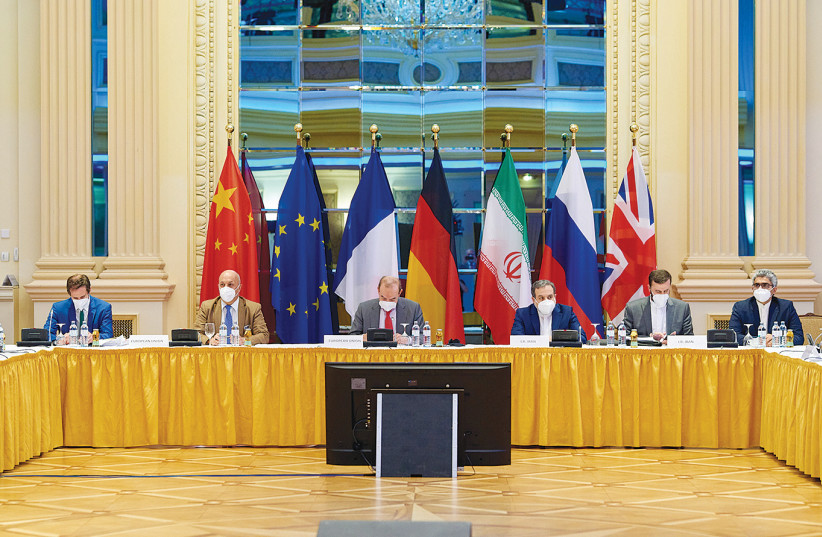Iran’s foreign minister appears to be on a roll. Hossein Amirabdollahian met with his Russian counterpart Sergei Lavrov on Wednesday in Moscow. Their meeting focused on renewed talks in Vienna that are related to the Iran deal. But Amirabdollahian is not just talking with the Russians, he also traveled to Beirut, where he is expected to meet leading Lebanese officials and boost support for Iran’s allies in Hezbollah.
More is sure to come. A strategic document may be signed with Moscow, Al-Mayadeen reports. Iran and Russia have similar stances on the issues in the region, the Iranian diplomat says. “In a related context, Al Mayadeen's correspondent revealed that the Iranian minister announced his readiness to visit Azerbaijan's capital, Baku, to enhance ties between the two countries,” the report says.
Amirabdollahian also has said his country does not accept "geopolitical changes" in the Caucasus. Tensions between Iran and Azerbaijan have been rising. "We certainly will not tolerate geopolitical change and map change in the Caucasus, and we have serious concerns about the presence of terrorists and Zionists in this region," he said.
This relates to Iran’s claims that Israel works closely with Baku. Iran recently hosted Armenia’s foreign minister in Tehran and it appears that the Islamic Republic has invited the Azerbaijan foreign minister as well.
Iran appears to want to increase transit and trade with Armenia. Kheirollah Khademi, Iran’s deputy transport minister and chief executive of a road-building company, arrived in the Armenian capital of Yerevan on Monday, according to reports.
Iran is deeply concerned by what it sees as Turkish meddling in the Caucasus, and also the chance that Iran could be cut off from Russia. Iran’s Fars News says that Turkey wants to redraw the map on the border.
“After its defeats and failures in the Libyan and Syrian cases, Turkey has a strong desire to at least achieve a minimal achievement in the Caucasus region,” it said. “This achievement, which is the land connection with the Republic of Azerbaijan, can implement Erdogan's plans to establish a land connection with the communication corridors with China without passing through Iran, which is an economic advantage.
Undoubtedly, if this plan is realized, Turkey's behavior will be even more aggressive,” Fars said. “The Russians have already seen and will likely consider many instances of this change in behavior in Turkey.” Iran’s point is to draw the Russian attention to the border area.

RUSSIA HAS different agendas. It sees the dispute between Azerbaijan and Armenia as a kind of local police action, and it wants to merely balance these former Soviet Socialist Republics, which it views as its near abroad, rather than treat them as equal countries.
Russia has bigger fish to fry with Turkey. It wants to work on trade and energy via TurkStream and the S-400s deals. That is more important for Moscow. But Iran is a friend of Russia, which takes care to consider what Tehran wants.
The Iranian foreign minister is talking much more than just with the Russians and about the Caucasus. In Beirut he offered “congratulations to the Lebanese people on the occasion of the formation of the new government," according to Al-Manar media, which is linked to Hezbollah. Emphasizing Tehran's continued support for Beirut, he explained: "The Islamic Republic will not hesitate to help and support Lebanon under any circumstances, if it requests any assistance."
It is important to keep in mind how differently Iranian media views the country’s previous and current foreign ministers. It tended to be critical of former foreign minister Javad Zarif, who was seen as a charlatan, pro-Western and someone who enjoyed the fruits of Western decadence more than the austerity that the regime projects. For instance, Zarif smiled too often when meeting Western officials, particularly those like Federica Mogherini of the EU.
By contrast, Amirabdollahian is more serious and dour. Fars News praises him for hitting the ground running. “After taking office, the foreign minister traveled to Baghdad to attend a regional meeting in support of Iraq, and from there traveled to Damascus to meet with Syrian officials,” the media says. “He also accompanied Ayatollah Ra'isi on a visit to the Tajik capital, Dushanbe, and traveled to New York in late September to attend the 76th session of the UN General Assembly.”
MEANWHILE IN Oman, the Iranians are also doing more outreach. Muscat has often tried to be neutral in regional tensions regarding Tehran. It has amicable relations with Iran. According to reports, talks were presided over by H E Sheikh Khalifa Ali al Harthy, the Oman Foreign Ministry’s Undersecretary for Diplomatic Affairs, and Dr. Ali Bagheri, Deputy Foreign Minister for Political Affairs of Iran. Iran’s foreign minister also held a call with his Oman counterparts to say he would support assistance for the country after a cyclone. The countries are discussing various regional issues.
What matters here is that Iran is shifting resources to its foreign ministry and appears to want to leverage its relations in the region. It is looking with interest at upcoming elections in Iraq and attempts by Jordan, Egypt, Iraq and the UAE to bring Syria back into closer relations with the Arab states. Iran is also interested in pressuring the US to withdraw from Syria and from facilities in northern Iraq.
Insofar as the Iranian foreign minister is now juggling several important files, from Caucasus to Syria, Hezbollah, the Iran deal talks and also the Gulf, he has a lot on his plate. So far he appears more capable than Zarif, who tended to prefer Western media hype and Twitter more than he actually accomplished on the ground. That may not have been Zarif’s fault entirely: Other Iranian key figures such as the IRGC and its late Quds Force commander Qasem Soleimani conducted their own foreign policy.
